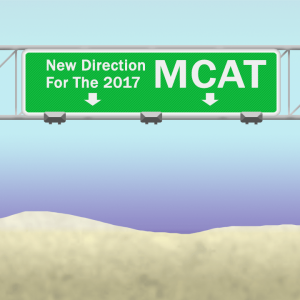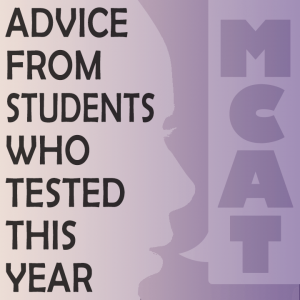 You need the MCAT for medical school.
You need the MCAT for medical school.
And yes, it’s 7.5 hours long.
Yes, it covers eight disciplines.
Yes, it takes a lot of preparation.
The best way to conquer something difficult is to be as prepared as possible.
When it comes to the MCAT, preparation doesn’t just mean content and practice.
It also requires understanding what to expect on test day.
Since the new MCAT was introduced in April 2015, it’s been changing and evolving as the AAMC is trying to figure out where to go with the exam.
The more they understand testing data and the more we understand what to expect,
the more prepared you will be going in.
As an MCAT tutor and advisor, I make it my business to know as much about this exam as I can.
This includes interviewing multiple students after each full length test to understand any shifts and changes in style, question types, and more.
2017 has brought some new interesting changes.
As I mentioned, the exam is always changing.
I want to share the trends I’ve noticed this year, so you’ll have a better understanding of what to expect.
This will help focus your study efforts as you prepare to conquer this beast.
The biggest change:
All the interviews have revealed the exam to be shifting to a heavier research focus.
This isn’t your college chemistry or physics class, where you are tested about a very narrow concept.
Instead, the MCAT presents research based material and asks you to make sense of the data using critical thinking supported by your science background.
How do you prepare for this?
Content is not enough.
In fact, content is just the foundation,
as we discuss in the Ultimate MCAT Prep Guide Step 5.
In addition to content and review, you should incorporate regular research article and journal reading as a modified approach to the Newspaper Strategy.
Don’t read the research for the sake of LEARNING the research.
Read to get comfortable seeing scary BIG words, multi-step experiments, and figuring out how to follow a hypothesis –> experiment –> data –> conclusion.
For some students, it’s a familiarity issue.
The more familiar you get with this type of reading, the less likely you’ll panic on test day.
That’s the biggest takeaway, but let’s also dive into the individual sections:
Chem/Phys
Just because the section is titled “Chemical and Physical Foundations of Biological System” does not mean it’s exclusively testing chemistry and physics.
In fact, students have reported many biochemistry and organic chemistry questions in this section, including amino acids.
- Low Yielding Topics –
When approaching this section, beware of studying only ‘high yield’ topics!
The AAMC chooses many low yield topics as the focus for each exam.This may include questions you see sporadically as well as topics you think are “so small I don’t have to worry about that.”
And worse still, many high yields hardly show up! - Fewer Calculations – You’re not allowed a calculator on the MCAT, but that’s okay.
While this section is the most math heavy, reportedly, it has been easier on the math in the last few exams.If you find yourself stuck in a detailed calculation, you’re probably overthinking it.
I have a whole video series devoted to teaching you how to do MCAT math WITHOUT a calculator. - Subject Delineation – There is no clear distinction between subjects.
A single passage will cover big-picture, intertwined sciences.
It’s important to be able to connect one to the next.
Every exam will focus on a few big topics. While one student may report ‘X topic didn’t show up on my exam,’ the next exam will have two passages on this very same topic.
Never take the advice of someone who says, “Don’t worry about this- it wasn’t tested.” Because your exam may very well have multiple passages on this!
This year’s exams, for example, alternate between surprisingly heavy Orgo to only some Orgo.
read this to understand Organic Chemistry on the MCAT
CARS
On the official MCAT, this section is longer and more difficult than on most of the available practice resources. Even the AAMC practice exams and passages.
This should be taken with a grain of salt.
Many students take full lengths on a small screen laptop, making the passages FEEL smaller/shorter.
The exam itself is on a desktop monitor, which may be larger than your laptop, and may have a larger font size than you’re accustomed to.
This makes a slightly longer passage feel EVEN LONGER.
While the passages are long, the questions aren’t super tricky.
Get comfortable reading about topics that bore you!
Spend a few hours reading about philosophy, politics, history, classics, literature, and the arts.
If it bores you, it’s PERFECT practice!
Bio/Biochem
This section has been very research based from the start.
It’s also a big-picture section, rather than ‘What does this mean?’ or ‘What does that do?’ section.
2017 testers report that there are not too many graphs and tables, and the passages are not too difficult to follow.
The big picture questions range from pathways to enzymes to organ systems.
There are also many questions on low yield topics and simple memorizations.
Get comfortable following a passage with many connected steps without getting bogged down in the details. Such as how A influences B which reacts with C, which hinders D…
These passages can make you feel cross eyed.
Read through the passage quickly to understand the main ideas.
Remember, you can always review details after reading the questions.
Psych/Soc
This section is the one that changed most drastically since last year.
In 2015/2016, this was considered the ‘easy’ section.
Simply memorize names/terms/theories and you’ll be okay.
Not this year.
The focus is – surprise surprise! – long passages on experimental and research design and analysis.
You’ll still see memorization questions, but with a focus on application, such as:
“Which of the following examples would mostly follow xyz theory?”
These questions force you to really think about what you know,
rather than just regurgitate “Who came up with Theory X?”
And yes, there’s still a ton of memorization for this section.
No single MCAT book has yet to capture everything required.
Study multiple sources for this section and practice reading research papers and journal articles to prepare.
Preparation
The best final preparation for this exam (Phase 2 & 3) will still come from the AAMC materials.
You should be utilizing all of the AAMC practice materials.
This includes the AAMC official guide, flashcards, section banks, and question packs, and of course the four full length exams.
The section banks reflect the new MCAT style. The question packs are more topic specific practice and less representative of the MCAT.
However, this is not enough!
Which is why additional resources, especially full lengths, are recommended.
Use third party resources PRIOR TO AAMC resources.
This way, when you’re nearing the end, you’re not distracted by the style of said third party questions, just in case they are different from the real thing.
Taking Care of Your Body
Your mental and physical state going into the exam will play a role in how you feel and perform.
- Build up your endurance so you don’t fatigue.
- Work on fixing your bedtime weeks before test day.
- Eat healthy foods the day before. Bring energizing non-sugary snacks on test day.
Advice from students who tested this year
Don’t just rely on JUST your books. –> Find related videos to hear the information from another perspective.
Don’t assume you know the information. –> Do practice after learning to see if you really got it.
Make sure you get through all of the AAMC questions –> Section banks are most similar to the real exam.
Don’t skip a topic because you think it’s low yield.
Don’t freak out. –> If you mess up in one section, give yourself a few minutes to be upset, then put it out of your mind. You still have each subsequent section to ace. Don’t let one bad section hurt the rest.
If you found it really hard, chances are others did too. –> It’s okay to miss a few questions here and there. Remember your target score is ‘competitive,’ not ‘perfect.’
Take planned breaks as you study. –> Avoids burnout rather than finding yourself on Facebook, then feeling guilty about it after.
Resources
Here are the resources the students practiced with. They are ranked in order of most to least recommended. All linked on the MCAT Resources Page.
Books
- Kaplan
- Examkrackers
- Princeton Review
- Barons
Exams
- AAMC
- Blueprint
- Examkrackers
- Gold Standard
- Princeton Review
Learn how to assemble and best utilize your resources with the Ultimate MCAT Prep Guide!




Hello
Thank you for the information and advice.
When I took the MCAT the inorganic chemistry was not presented as I expected. I did not understand the format of several questions relating to a chart. I felt that even though I knew the chemistry material and prepared, I was expected to figure out how to interpret the questions during the test, with no way to practice beforehand. How can I find questions that are in the same format as those on the actual MCAT? It was not the chemistry knowledge that was missing, it was that I didn’t know how to interpret the information presented on the test so I could answer the question.